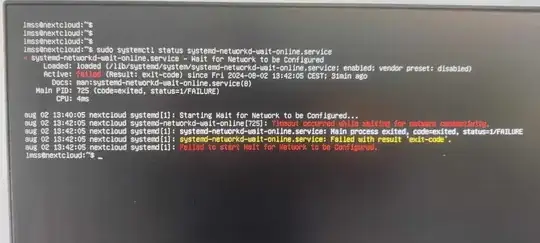Ubuntu Server 24.04 LTS:
I decided to splash some money at a static IP from my ISP.
It probably kicked in sometime yesterday night, because since then I've been unable to connect any Ubuntu server I have to the internet, because of a systemd error.
EDIT: While writing an edit, I managed to SSH to one server, but not another.
Info requested in the comments:
Home Device "Router" information (mildly redacted):
WAN IPv4: SOMETHING (as expected) WAN IPv6: N/A Primary and Secondary DNSv4: SOMETHING (as expected)
DHCP Server: DHCP is Active
Gateway IP adress: 10.0.0.1 Lan subnet mask: 255.255.255.0 First IP adress: 10.0.0.2 Last IP adress: 10.0.0.254
1 static DHCP lease for Pihole 4 dynamic DHCP leases
No Port redirection (There normally would be, but the device got rebooted this morning)
DNS Settings No active DNS at this time (I want to rule out Pihole as a culprit)
Firewall: Medium settings (recommended)
lmss@nextcloud:~$ ip a
1: lo: <LOOPBACK,UP,LOWER_UP> mtu 65536 qdisc noqueue state UNKNOWN group default qlen 1000
link/loopback 00:00:00:00:00:00 brd 00:00:00:00:00:00
inet 127.0.0.1/8 scope host lo
valid_lft forever preferred_lft forever
inet6 ::1/128 scope host
valid_lft forever preferred_lft forever
2: eno1: <NO-CARRIER,BROADCAST,MULTICAST,UP> mtu 1500 qdisc fq_codel state DOWN group default qlen 1000
link/ether 00:23:24:41:b8:29 brd ff:ff:ff:ff:ff:ff
altname enp0s25
3: wlp2s0: <BROADCAST,MULTICAST,UP,LOWER_UP> mtu 1500 qdisc mq state UP group default qlen 1000
link/ether 60:36:dd:0f:d3:ea brd ff:ff:ff:ff:ff:ff
inet 10.0.0.2/24 metric 600 brd 10.0.0.255 scope global dynamic wlp2s0
valid_lft 84044sec preferred_lft 84044sec
inet6 fd30:3733:3233:0:6236:ddff:fe0f:d3ea/64 scope global dynamic mngtmpaddr noprefixroute
valid_lft 866sec preferred_lft 266sec
inet6 fe80::6236:ddff:fe0f:d3ea/64 scope link
valid_lft forever preferred_lft forever
lmss@nextcloud:~$ ip link show
1: lo: <LOOPBACK,UP,LOWER_UP> mtu 65536 qdisc noqueue state UNKNOWN mode DEFAULT group default qlen 1000
link/loopback 00:00:00:00:00:00 brd 00:00:00:00:00:00
2: eno1: <NO-CARRIER,BROADCAST,MULTICAST,UP> mtu 1500 qdisc fq_codel state DOWN mode DEFAULT group default qlen 1000
link/ether 00:23:24:41:b8:29 brd ff:ff:ff:ff:ff:ff
altname enp0s25
3: wlp2s0: <BROADCAST,MULTICAST,UP,LOWER_UP> mtu 1500 qdisc mq state UP mode DORMANT group default qlen 1000
link/ether 60:36:dd:0f:d3:ea brd ff:ff:ff:ff:ff:ff
lmss@nextcloud:~$ cat /etc/netplan/00-installer-config.yaml
# This is the network config written by 'subiquity'
network:
ethernets:
eno1:
dhcp4: true
version: 2
lmss@nextcloud:~$ sudo cat /etc/netplan/00-installer-config-wifi.yaml
[sudo] password for lmss:
# This is the network config written by 'subiquity'
network:
version: 2
wifis:
wlp2s0:
access-points:
SOME-SSID:
password: SOMETHING
dhcp4: true
lmss@nextcloud:~$
--
$sudo systemctl status systemd-networkd-wait-online.service
returns the same information on all devices I have tried - including also a fresh installation from this morning.
This photo shows the error:
Pihole on RaspberryPi OS and Windows 11 runs without incident.
Systeminformation reports a local IP has been set, but the device does not show up in my router dashboard.
Inspired by the solution at systemd-networkd-wait-online service timing out during boot I tried to run
$sudo ./lib/systemd/systemd-networkd-wait-online
Which got me nowhere. The service simply timed out.
I tried to stop and disable the service:
$sudo systemctl stop systemd-networkd-wait-online.service
$sudo systemctl disable systemd-networkd-wait-online.service
Which was also a dud.
I have no idea what goes on. Anything is appreciated.
EDIT 1: My devices are connected via a "router" to my ISP. It's a pretty basic home network setup, like most people have. They are cabled into the "router" with no other hardware between. The "router" - ahem "Home Device" - has an active firewall with factory settings.
EDIT 2: The devices boot to the extend that I end up with a stand alone-device that can't connect to the internet. I
